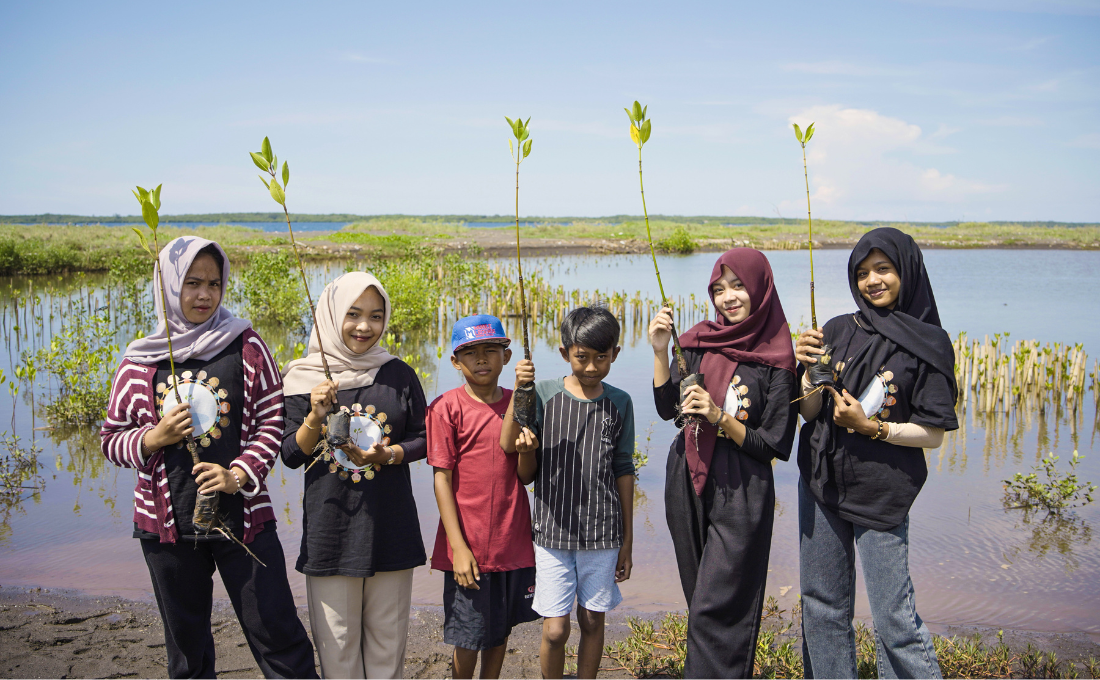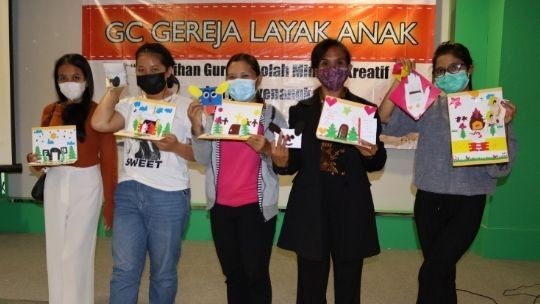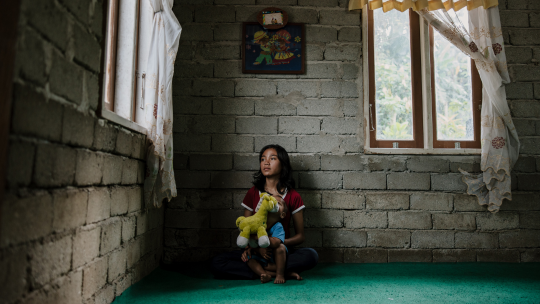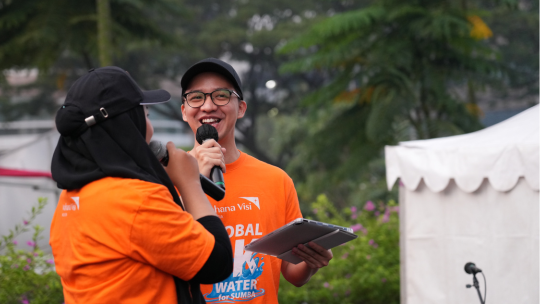East Lombok Take Action to Protect Earth

East Lombok Regency has the largest mangrove area among other regencies on Lombok Island. However, around 1,600 hectares, or 50%, are in damaged condition. The destruction of mangrove forests can have a detrimental impact on the environment, marine life, and the coastal community's economy. If mangrove forests are not restored immediately, it will increase the area's vulnerability to tidal floods, worsen the climate crisis, cause the disappearance of marine life habitats, and reduce the income of coastal communities.
"My parents and others too say that the mangrove area used to be thicker, and the coastline was also wider. But now the mangroves are getting thinner, and the coastline is also shrinking due to abrasion," said Halwa (15), a young girl living in the coastal area of East Lombok. "Therefore, the mangrove environment is very important for us to preserve because if this environment is damaged, our future will also be disrupted," expressed Olivia (17), Halwa's friend who shares the same concern for environmental issues.
Halwa, Olivia, and other children living in the villages assisted by the MARVEL (Mangrove Adaptive and Resilient Village for Enhanced Livelihoods) project in East Lombok are increasingly aware and vocal in voicing the importance of mangrove restoration after being involved in the Children's Forum. The MARVEL project was initiated by Wahana Visi Indonesia (World Vision Indonesia). In addition to involving the Children's Forum in the mangrove restoration movement, this project also involves women's groups, stakeholders, and other local partners.
"To protect the environment, we participate in mangrove planting and protection activities. Besides that, together with the Children's Forum, we also carry out socialisation related to child and environmental issues," said Jaskia (13). Mangrove restoration will be a way to repair the ecology which will advance the economy. Children and communities in East Lombok are starting this important action by planting mangrove seedlings and also the seeds of businesses that prioritise sustainability.
The Green Savings and Loans Group
The community in East Lombok has the potential to develop their understanding of financial literacy. Access to financial services is widespread, and the community is already familiar with them. For example, there are cooperatives and banks that are easily accessible to the community. People also know how cooperatives and banks operate and what services are available.
However, most people in East Lombok have not yet realised that financial literacy is not just about access and facilities but also about the skills to manage household finances. Families use the funds or capital they have for consumptive needs. As a result, these funds or capital do not generate profit and often even lead to losses. The economic potential of mangrove restoration is also difficult to explore because people are not yet accustomed to managing household finances.
WVI, in collaboration with the village government, is trying to address this challenge by implementing two training programmes: Gender Inclusive Financial Literacy (GIFT) and the Saving for Transformations (S4T). The aim is to educate the community, including small business owners, fishermen, farmers, cadres, and other entrepreneurs, on how to manage their household and business finances effectively so that they can achieve financial independence. This training also highlights the role of women in advancing the family economy.
Through this training, mothers were introduced to S4T for the first time. They began to understand that S4T savings and loan groups can be a viable alternative to start managing household finances. Mothers also began to understand the benefits of shared financial decision-making within the family. This allows mothers to be involved in determining the priority needs within the family, one of which is the needs of children.
"With the S4T programme, we can learn to save by setting aside money so that it can be useful for the future," said Siti, a trader and waste collector in one of the villages. "We also learn to limit ourselves from being consumptive. Usually, when fishermen return from the sea, they can earn a lot of money. However, because most wives cannot manage finances well, families become consumptive and there is nothing saved. But with this training, we are taught how to manage household finances, and I believe I can do it," she added. Currently, five S4T groups have been formed, consisting of cadres, fishermen, traders, farmers, and other community members. The majority of the members are mothers.
Financial literacy skills are a valuable asset for the community in East Lombok. The mangrove restoration they are undertaking will have a positive impact on the economy. Mangrove forests have the potential for eco-tourism, silvofishery, processed mangrove products, and much more. When that time comes, families in East Lombok will be ready to manage capital and run businesses well. Through the S4T groups that have now been formed, the community can save capital to run businesses originating from mangrove restoration.
Silvofishery: A Green Economic Opportunity in East Lombok
Silvofishery is a traditional aquaculture system that integrates fish farming (or ponds) with the planting or management of mangrove forests. This system can have a positive impact on both ecology and the economy. This means that with the return of mangroves around the coast, the variety of marine life will also return, creating income-generating opportunities. Silvofishery is a sustainable approach because it focuses on mangrove conservation, which also has an economic impact on communities. This system is often also referred to as Wanamina.
East Lombok Regency has significant potential for implementing silvofishery. WVI, in collaboration with Professor Dr. Esti Handayani Hardi, S.Pi, M.Si, an academic from the Faculty of Fisheries and Marine Science at Mulawarman University, conducted a field visit to East Lombok to assess this potential. The expert, who has extensive experience in silvofishery mentoring, also explained that with the presence of mangrove areas and fish ponds in East Lombok, silvofishery is very feasible to implement. However, going forward, attention needs to be paid to hydrological challenges and pond depth to ensure the system can be implemented effectively.
"We didn't really understand how the pond process should be done properly, so there were many mistakes in the pond preparation stage that made our pond yields less than optimal. With the silvofishery concept, we hope to improve the condition of our ponds as well as the existing mangrove ecosystem in the village," said Herman (41), a fish farmer in the village.
However, with the field visit and the transfer of knowledge between Professor Esti and the community, the fish farmers in East Lombok are gradually becoming more familiar with the intricacies of silvofishery. "Being able to meet and discuss with a fisheries cultivation expert is a valuable experience. Silvofishery is a good concept where there is an integration between ponds and mangroves. So far, the ponds I manage haven't yielded maximum results due to a lack of knowledge in the technical aspects of pond construction and management," said Suhirman (45).
Currently, fish farmers in the MARVEL project's assisted villages are willing to try implementing silvofishery in five pond areas. These five pilot ponds have also received support from the local government. The Head of Bappeda for East Lombok, M. Zaidarrohman, S.S.T.P, M.H, stated that silvofishery is one alternative economic activity that has great potential for communities in coastal areas. He added that mangrove restoration offers hope for supporting environmental preservation and economic progress in East Lombok.
WVI will continue to support this process and learn alongside the fish farmers. The hope is that silvofishery in East Lombok can become a sustainable, environmentally friendly business.
Trigona Bee Cultivation in Mangrove Forests
Besides fish or shrimp ponds, the mangrove ecosystem also has another economic benefit: trigona bee cultivation. Recognising the potential of the mangrove areas in East Lombok, cultivating trigona honey bees would be very advantageous. The honey and propolis produced by trigona bees have high economic value. Moreover, trigona bee cultivation is relatively easy because this type of bee does not sting.
WVI, through the MARVEL project, facilitated trigona bee cultivation training for communities in the assisted villages. "We are very enthusiastic about this activity. Being able to get involved and have hands-on practice in trigona bee cultivation is a great start. We've learned how to cultivate trigona bees, identify their food sources, how to transfer colonies, and how to harvest. Our hope is that we can seriously and diligently carry out this cultivation so that it is sustainable and can become an alternative source of income for the community," said Aliman, one of the participants.
The village government is very enthusiastic and supportive of economic improvement activities with Wahana Visi Indonesia. Representing the village, Tajudin, the Village Head, said, "Trigona honey cultivation training has good prospects. Therefore, the village is committed to providing support by distributing trigona bee colonies to community groups through the BUMDes (Village-Owned Enterprise). The hope is that this can be sustainable and increase community income."
Author: Maria Pratiwi (MARVEL Project Coordinator in East Lombok)
Editor: Mariana Kurniawati (Communication Executive)



